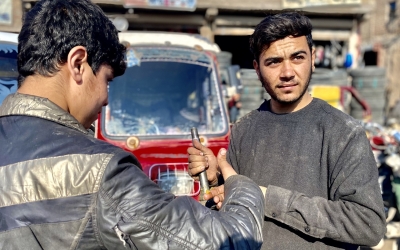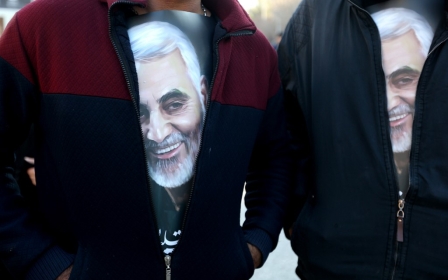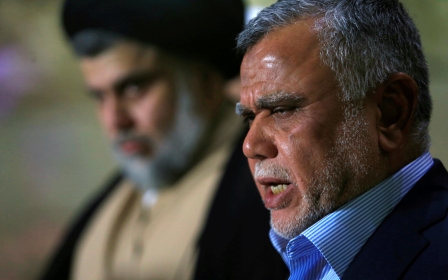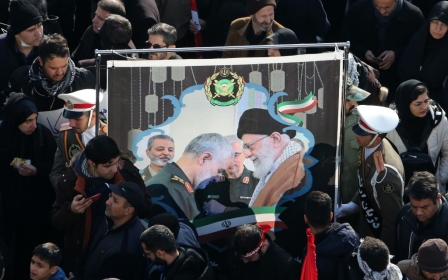For Afghans caught up in Syria's war, Soleimani's death is a relief

When Fatima returned to Iran in 2017, she sensed something wrong in her community of Afghan refugees. The boys were not all right.
“I saw that so many healthy, happy young men - our family, our neighbours - had become addicts. They would suddenly start crying and yelling, or they cut themselves off from everyone else,” she says, unable to fight back tears.
It didn’t take long for her to realise what had caused this change among the boys in her family and the Afghan community in Mashhad at large: they had all been sent to Syria to fight in support of Bashar al-Assad’s government.
“The war in Syria was like a wave that crashed into our boys,” Fatima says sitting in a crowded Kabul eatery. Like everyone interviewed by Middle East Eye, Fatima is speaking under a false name for security reasons.
'So many of our boys, 17, 18 years old, were sent off to the front lines. We had to bury them in silence, never able to ask what befell them'
- Fatima
“So many of our boys, 17, 18 years old, were sent off to the front lines. We had to bury them in silence, never able to ask what befell them in that country.”
New MEE newsletter: Jerusalem Dispatch
Sign up to get the latest insights and analysis on Israel-Palestine, alongside Turkey Unpacked and other MEE newsletters
Some 14,000 Afghans are estimated to have been sent to Syria under Iranian command, fighting against rebel factions and the Islamic State group in the Fatemiyoun Brigades. It is unclear how many of them have died there.
Fatima says the boys who did manage to make it back alive were forbidden to speak of what happened in Damascus, Aleppo, Idlib and the other embattled cities they were dispatched to.
For tens of thousands of Afghans in Afghanistan and Iran, there was only one man to blame for this phenomenon: Qassem Soleimani, the commander of Iran’s elite Quds Force.
“He made his name off the back of our boys, our Afghans,” she says of the man known in Iran as Sardar.
'A murderer'
To Fatima, the recruitment of Afghan boys, some as young as 14, was only the latest abuse of Afghan refugees in Iran, a country that has repeatedly come under criticism for its harsh treatment of the three million Afghans who call the neighbouring Islamic Republic home.
Knowing this, Fatima says she was relieved by the 3 January assassination of Soleimani, who was killed by a US drone strike in Baghdad.
For other Afghans who grew up in Iran, Soleimani’s killing in a foreign country was demonstrative of his legacy as a powerful commander overseeing Tehran’s involvement in regional conflicts.
“The people of Iran were suffocating under the poverty [of US-imposed sanctions], and the Islamic Revolutionary Guard Corps was off funding Iran’s incursions in foreign wars,” says Homaira, a friend of Fatima’s who was also raised in Iran.
If Fatima is saddened by the treatment of Afghan refugees in Iran, Homaira, who speaks in a booming, formidable voice, is enraged by it.
“We all saw him as nothing more than the murderer of thousands of our people,” Homaira says, her voice echoing across the restaurant.
Both women, in their late 20s and now living in the Afghan capital, know they could never speak so openly about these matters in Iran, but say that for Afghans, the truth about Soleimani has always been perfectly clear.
Homaira says Soleimani’s foreign intrusions didn’t end in the Middle East, that his forces had an equal hand in the ongoing conflict in Afghanistan as well. She points to the western province of Farah, which nearly fell to the Taliban in 2018, as an example.
At the time, General Nurullah Qaderi, an Afghan army commander in Farah, explicitly accused Iran of supporting the Taliban, saying: “We share a 290-km border with Iran, a country that we call our friend, but on the contrary, Iran is our enemy."
For its part, Tehran has denied assisting the Taliban or interfering in Afghanistan's domestic affairs.
However, the Taliban has recently sent delegations to Iran, as peace talks with the US faltered.
Homaira and Fatima both believe that Soleimani played a key role in keeping Iran safe from the Islamic State group, which between 2013 and 2017 ran rampant in next-door Iraq.
But, they say, the fear of the militant group’s expansion also was part of the Iranian commander’s propaganda campaign to recruit young Afghan men to fight in Syria.
With accusations of Iran aiding and abetting the Taliban in the provinces of Herat, Farah, Helmand and Ghazni, both women say they were shocked to see Afghan politicians, including Second Vice President Mohammad Sarwar Danish, Chief Executive Abdullah Abdullah and former president Hamid Karzai, offering condolences upon Soleimani’s death.
“These Afghan leaders knew about Soleimani, they knew about the Fatemiyoun Brigade [in Syria] … Why would you ever offer condolences to a country that interferes in our affairs and aids the enemy?” Homaira says.
'We can't hate him'
But there are some Afghans who lived in Iran who see Soleimani in a very different light.
Fawad, who spent more than two decades in Iran, says Soleimani “raised Iran’s flag all over the world … People saw him as someone who defended the religion of Islam”.
In the 1980s, Fawad’s family relocated to Iran, where they sought refuge from the Soviet occupation. Because of this, Fawad says he had a very different experience in Iran that shielded him from recruitment into the Fatemiyoun Brigades.
Unlike Fatima’s family, Fawad’s held refugee registration cards and work permits, which limited their fear of deportation. All of the Afghans speaking to Middle East Eye said the threat of deportation was a major factor in the recruitment of Afghans into the Syrian war.
Because of this, Fawad had a very different vision of Soleimani. He credits him for his relationship with leaders of the war against the brutal Soviet occupation of Afghanistan.
“Soleimani was the link between the [anti-Soviet] Mujahideen forces and Iran,” Fawad says.
'Soleimani was the link between the [anti-Soviet] Mujahideen forces and Iran'
- Fawad
Knowing this, Fawad says he was saddened by Soleimani’s death.
“He was someone who helped the Afghan people. You can’t dislike him just because you dislike the government” of Iran, he says.
Despite his many advantages, Fawad was not blind to the recruitment of other young Afghan men into the Syrian war. He specifically recalls mullahs in mosques encouraging Afghans to “defend the religion” and the banners that hung from Iranian universities.
He says that members of the Basij, a mainly youth-led wing of the IRGC known for its brutality, would come to the universities asking for donations for the war effort in Syria. There was one name, however, that Fawad says was never uttered in all the recruitment efforts: Bashar al-Assad.
Fawad admits that it wasn’t just his documents that likely shielded him from recruitment in the Fatemiyoun Brigades.
“I spoke perfect Iranian Farsi and I also don’t look like what Iranians see as an Afghan,” he says, referring to accusations of overt racism against Afghanistan’s Hazara minority in Iran, who also made up the majority of the Fatemiyoun Brigades.
In the end, Fawad knows that his experiences in Iran as a non-Hazara Shia Afghan in Iran greatly impacted his view of life in Iran, but he remains adamant that the death of Soleimani was a loss to the world.
“He served his nation’s interests, and we can’t hate him for that.”
This article is available in French on Middle East Eye French edition.
Middle East Eye delivers independent and unrivalled coverage and analysis of the Middle East, North Africa and beyond. To learn more about republishing this content and the associated fees, please fill out this form. More about MEE can be found here.





